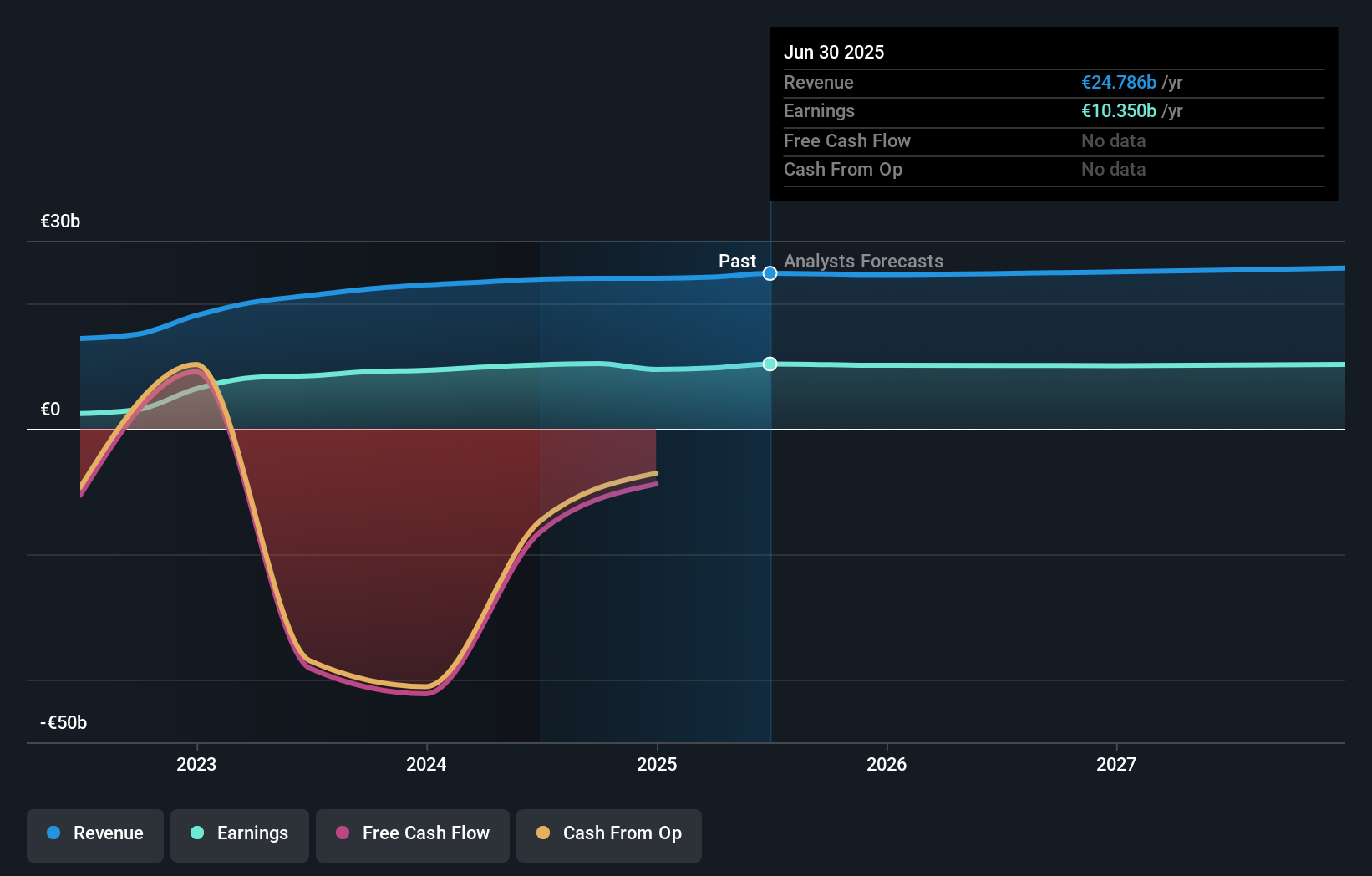UniCredit S.p.A. Beat Analyst Estimates: See What The Consensus Is Forecasting For This Year
Investors in UniCredit S.p.A. (BIT:UCG) had a good week, as its shares rose 5.4% to close at €61.23 following the release of its interim results. It looks like a credible result overall - although revenues of €13b were what the analysts expected, UniCredit surprised by delivering a (statutory) profit of €2.16 per share, an impressive 34% above what was forecast. The analysts typically update their forecasts at each earnings report, and we can judge from their estimates whether their view of the company has changed or if there are any new concerns to be aware of. So we collected the latest post-earnings statutory consensus estimates to see what could be in store for next year.

Following last week's earnings report, UniCredit's 13 analysts are forecasting 2025 revenues to be €24.6b, approximately in line with the last 12 months. In the lead-up to this report, the analysts had been modelling revenues of €24.5b and earnings per share (EPS) of €6.38 in 2025. Overall, while the analysts have reconfirmed their revenue estimates, the consensus now no longer provides an EPS estimate. This implies that the market believes revenue is more important after these latest results.
See our latest analysis for UniCredit
The average price target rose 7.6% to €65.43, with the analysts clearly having become more optimistic about UniCredit'sprospects following these results. It could also be instructive to look at the range of analyst estimates, to evaluate how different the outlier opinions are from the mean. The most optimistic UniCredit analyst has a price target of €75.00 per share, while the most pessimistic values it at €54.00. Analysts definitely have varying views on the business, but the spread of estimates is not wide enough in our view to suggest that extreme outcomes could await UniCredit shareholders.
Another way we can view these estimates is in the context of the bigger picture, such as how the forecasts stack up against past performance, and whether forecasts are more or less bullish relative to other companies in the industry. We would highlight that revenue is expected to reverse, with a forecast 1.5% annualised decline to the end of 2025. That is a notable change from historical growth of 17% over the last five years. Compare this with our data, which suggests that other companies in the same industry are, in aggregate, expected to see their revenue grow 2.5% per year. It's pretty clear that UniCredit's revenues are expected to perform substantially worse than the wider industry.
The Bottom Line
The clear take away from these updates is that the analysts made no change to their revenue estimates for next year, with the business apparently performing in line with their models. Fortunately, the analysts also reconfirmed their revenue estimates, suggesting that it's tracking in line with expectations. Although our data does suggest that UniCredit's revenue is expected to perform worse than the wider industry. We note an upgrade to the price target, suggesting that the analysts believes the intrinsic value of the business is likely to improve over time.
At least one of UniCredit's 13 analysts has provided estimates out to 2027, which can be seen for free on our platform here.
You should always think about risks though. Case in point, we've spotted 2 warning signs for UniCredit you should be aware of, and 1 of them can't be ignored.
New: AI Stock Screener & Alerts
Our new AI Stock Screener scans the market every day to uncover opportunities.
• Dividend Powerhouses (3%+ Yield)
• Undervalued Small Caps with Insider Buying
• High growth Tech and AI Companies
Or build your own from over 50 metrics.
Have feedback on this article? Concerned about the content? Get in touch with us directly. Alternatively, email editorial-team (at) simplywallst.com.
This article by Simply Wall St is general in nature. We provide commentary based on historical data and analyst forecasts only using an unbiased methodology and our articles are not intended to be financial advice. It does not constitute a recommendation to buy or sell any stock, and does not take account of your objectives, or your financial situation. We aim to bring you long-term focused analysis driven by fundamental data. Note that our analysis may not factor in the latest price-sensitive company announcements or qualitative material. Simply Wall St has no position in any stocks mentioned.
About BIT:UCG
UniCredit
Provides commercial banking services in Italy, Germany, Central Europe, and Eastern Europe.
Undervalued with adequate balance sheet and pays a dividend.
Similar Companies
Market Insights
Community Narratives


Recently Updated Narratives


MINISO's fair value is projected at 26.69 with an anticipated PE ratio shift of 20x


The Quiet Giant That Became AI’s Power Grid


Nova Ljubljanska Banka d.d will expect a 11.2% revenue boost driving future growth
Popular Narratives


The company that turned a verb into a global necessity and basically runs the modern internet, digital ads, smartphones, maps, and AI.


MicroVision will explode future revenue by 380.37% with a vision towards success



